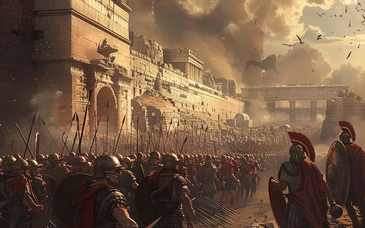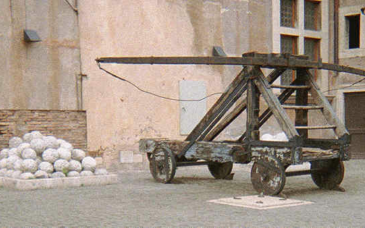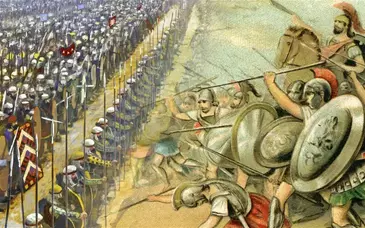Weapons of War
You Might Also Like:

Read More
This page is concerned with ancient warfare, covering the period between the Mycenean World and the Byzantine Empire. The main focus is bibliographic, though other sections cover other aspects, e.g. other resources, course syllabi, etc.. Some sections are still under construction, especially the Byz...
Read More
Surviving Greek and Roman texts reveal the remarkable level of mathematical and engineering skill that went into the development of these early ballistic-missile launchers
by Werner Soedel and Vernard Foley Scientific American, March 1979, pp. 150 - 160
Web version made available with additional dia...
Read More
The book of Judges describes the period when the Israelites were settling into the Promised Land following the Exodus from Egypt. Because the conquest was not complete, warfare was frequent, and resulted in the hero stories preserved in Judges. These heroes were known as "judges", meaning, not peopl...
Read More
Ballista - an ancient missile weapon which launched a large projectile at a distant target
The ballista (Latin, from Greek βαλλίστρα - ballistra and that from - βάλλω ballō, "throw"), plural ballistae, was an ancient missile weapon which launched a large projectile at a distant target.
Developed fro...
Read More
Kris (or Keris): an asymmetrical dagger
The kris or keris is an asymmetrical dagger indigenous to Indonesia, Malaysia, Singapore, Thailand and Brunei. It is known as kalis in the southern Philippines. The kris is famous for its distinctive wavy blade, but many have straight blades as well. Both a we...
Read More
Siege Tower (or Belfry): a siege engine to protect attackers while approaching a fortification.
A siege tower (or in the Middle Ages a belfry) is a specialized siege engine, constructed to protect assailants and ladders while approaching the defensive walls of a fortification. The tower was often re...
Read More
Battering Ram: a siege engine designed to break open fortifications
A battering ram is a siege engine originating in ancient times and designed to break open the masonry walls of fortifications or splinter their wooden gates. It was used, too, in ancient Roman mines and quarries to attack hard rocks...
Read More
Mangonel: type of catapult or siege machine used to throw projectiles at a castle's walls
A mangonel (derived from Greco-Latin word manganon, meaning "engine of war")was a type of catapult or siege machine used in the medieval period to throw projectiles at a castle's walls. The exact meaning of the...
Read More
Trebuchet: a siege engine employed in the Middle Ages
A trebuchet (from the French trébuchet) is a siege engine that was employed in the Middle Ages. It is sometimes called a "counterweight trebuchet" or "counterpoise trebuchet" in order to distinguish it from an earlier weapon that has come to be c...
Read More
Polybolos - an ancient Greek repeating ballista
Polybolos was an ancient Greek repeating ballista reputedly invented by Dionysius of Alexandria, a 3rd century BC Greek engineer at the Rhodes arsenal and used in antiquity. Philo of Byzantium encountered and described the polybolos, a catapult that li...
Read More
Corvus - a Roman military boarding device used in naval warfare
The corvus ("crow" in Latin) or harpago (probably the correct ancient name) was a Roman military boarding device used in naval warfare during the First Punic War against Carthage.Boarding-bridge diagram.
In the book History, by Polybius...
Read More

Read More
The Ancient Roman Empire is renowned for its military prowess and engineering marvels, and one of the most iconic war machines from that era was the catapult. This formidable invention played a crucial role in shaping the outcomes of battles, and its engineering principles have left a lasting legacy...
Read More

Read More
The Persian Wars were a series of conflicts between the Achaemenid Empire and Greek city-states that started in 499 BC and lasted until 449 BC. The collision between the fractious political world of the Greeks and the enormous empire of the Persians began when Cyrus the Great conquered the Greek-inh...
Read More